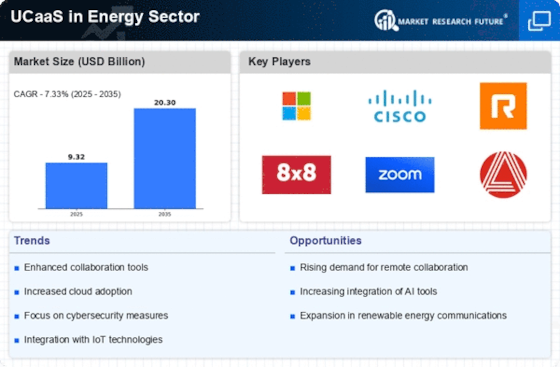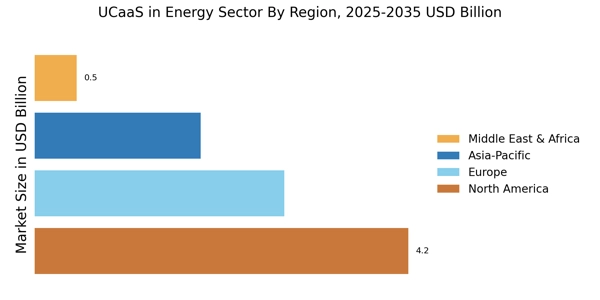Integration of Advanced Analytics
The integration of advanced analytics within the UCaaS in Energy Sector Market is transforming how companies operate. By leveraging data analytics, energy firms can gain insights into communication patterns, employee engagement, and operational efficiency. This capability allows organizations to make informed decisions that enhance productivity and streamline processes. Recent studies indicate that companies utilizing analytics in their communication strategies report a 25% increase in operational efficiency. As energy companies increasingly recognize the value of data-driven decision-making, the demand for UCaaS solutions that incorporate advanced analytics is expected to rise. This trend underscores the importance of technology in optimizing communication and collaboration in the energy sector.
Cost Efficiency and Operational Agility
Cost efficiency and operational agility are pivotal drivers in the UCaaS in Energy Sector Market. Energy companies are increasingly seeking solutions that not only reduce communication costs but also enhance operational flexibility. The shift to cloud-based communication platforms allows organizations to scale their operations without the burden of significant upfront investments. Data shows that companies adopting UCaaS solutions have achieved cost savings of up to 40% in communication expenses. This financial advantage, coupled with the ability to quickly adapt to changing market conditions, positions UCaaS as a strategic asset for energy firms. As the industry evolves, the emphasis on cost efficiency and agility is likely to propel further adoption of UCaaS technologies.
Increased Demand for Remote Work Solutions
The UCaaS in Energy Sector Market is experiencing a notable surge in demand for remote work solutions. As energy companies seek to enhance operational efficiency, the adoption of cloud-based communication tools has become paramount. According to recent data, approximately 70% of energy firms have integrated remote work technologies into their operations. This shift not only facilitates seamless communication among teams but also supports the growing trend of flexible work arrangements. The ability to collaborate effectively from various locations is crucial in an industry that often operates in remote areas. Consequently, the UCaaS in Energy Sector Industry is likely to witness continued growth as organizations prioritize tools that enable remote collaboration and maintain productivity.
Focus on Sustainability and Green Initiatives
The UCaaS in Energy Sector Market is increasingly aligning with sustainability and green initiatives. As energy companies strive to reduce their carbon footprint, the adoption of cloud-based communication solutions is seen as a viable strategy. These solutions not only minimize the need for physical infrastructure but also support remote work, thereby reducing travel-related emissions. A report indicates that energy firms implementing UCaaS solutions have reduced their operational carbon emissions by up to 30%. This focus on sustainability is likely to drive further investment in UCaaS technologies, as organizations seek to enhance their environmental responsibility while maintaining effective communication and collaboration.
Regulatory Compliance and Security Enhancements
In the UCaaS in Energy Sector Market, regulatory compliance and security enhancements are becoming increasingly critical. Energy companies are subject to stringent regulations regarding data protection and communication security. As a result, there is a growing demand for UCaaS solutions that offer robust security features and compliance capabilities. Recent data suggests that over 60% of energy firms prioritize security when selecting communication tools. This trend indicates that UCaaS providers must continuously innovate to meet the evolving security needs of the industry. By ensuring compliance with regulations and enhancing security measures, UCaaS solutions can foster trust and reliability among energy companies.


















